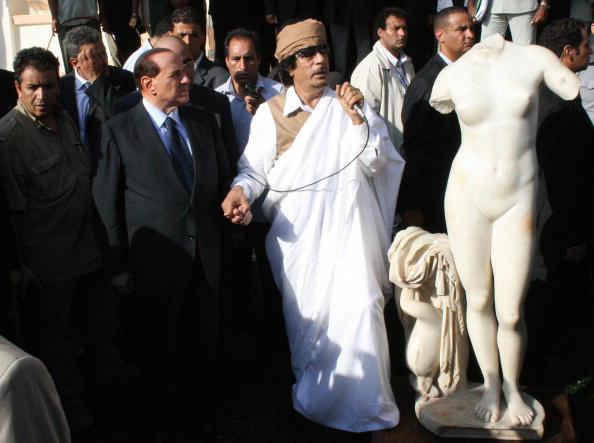The scandals that buzz ever more insistently around Italian Prime Minister Silvio Berlusconi are hardly the first that old Rome has ever seen. Julius Caesar, in addition to being a good deal more intelligent and better looking than his contemporary counterpart (although similarly challenged when it came to the amount of hair on his head), was also a far more charismatic lover—and unlike Berlusconi, who recently declared “It’s better to be passionate about pretty girls than gay,” Caesar happily bedded both men and women. Hordes of prostitutes flocked in their time to the imperial residence on the Palatine Hill, as many, perhaps, as have ever gathered chez Berlusconi for sing-alongs, gelati, and “bunga-bunga” (a word and orgiastic practice the prime minister allegedly learned from his good friend Muammar Qaddafi).
Furthermore, Berlusconi has never—as far as we know—dressed up as a female prostitute himself, as the third-century emperor Elagabalus liked to do. As the historian Dio Cassius reports, that young ruler, despite the five wives he acquired and shed during his brief reign,
would go to the taverns by night, wearing a wig, and there ply the trade of a female huckster. He frequented the notorious brothels, drove out the prostitutes, and played the prostitute himself. Finally, he set aside a room in the palace and there committed his indecencies, always standing nude at the door of the room, as the harlots do, and shaking the curtain that hung from gold rings, while in a soft and melting voice he solicited the passers-by.
And if Berlusconi phoned the police station in Milan to negotiate for the release of a seventeen-year-old accused thief and sometime intimate acquaintance with the stage name “Ruby,” at least he didn’t make Ruby a cardinal, as Pope Julius III did with his own seventeen-year-old paramour, Innocenzo Ciocchi del Monte, in 1550.
Julius III died of natural causes in 1555, but Caesar and Elagabalus ended less happily: the former stabbed, of course, by a cabal of Senators in 44 B.C.E., and the latter slain in the year 222 at the tender age of 18 by the Praetorian Guard, the imperial security force. Senators, cardinals, and Praetorians are willing to put up with a good deal of eccentricity in a chief executive so long as they preserve their own privileges, but sometimes enough is enough even for them, and then they move swiftly and implacably.
Berlusconi’s senators and Praetorians are not quite at that point of exasperation— so far, the checks, favors, and tax exemptions have kept on coming—but they are getting closer. The rest of Italy is closer still, struggling as it is to make ends meet as the world financial crisis continues, as manufacturing jobs slip away to Eastern Europe, and as the government’s budget cuts slash away at schools, hospitals, and infrastructure. As Pompeii crumbles and torrential rains flood the peninsula, a steady exodus has begun to descend the gangplanks of Berlusconi’s ship of state, a sure sign that water is rising in the bilge. Guido Bertolaso, the head of the Civil Protection Service, so conspicuous in responding to such emergencies as the L’Aquila earthquake and the first Neapolitan garbage crisis, announced November 4 that he would step down. On November 8, Gianfranco Fini, President of the Chamber of Deputies (equivalent to Speaker of the House), ratified the creation of a new party, Future and Freedom for Italy, and blasted his former ally, calling for Berlusconi’s resignation and an end to the present government. Now, Comedian Maurizio Crozza, in his Tuesday night television routine, has taken up the refrain that has been on everyone’s lips: “Will someone please pull the plug?”
And there are other portents. Despite the apparent ubiquity of Ruby and her like, Italian women are just as often making news for their straightforward achievements of mind, will, and political engagement, proving that the prime minister and his media empire have not reduced their role entirely to displays of flesh. Thus Emma Marcegaglia, the young head of the industrialists’ organization, Confindustria, has a brand-new sparring partner in the freshly elected head of the powerful CGIL labor union, Susanna Camusso. Neither is the type to put up with the kind of nonsense Ruby and bunga-bunga represent; Marcegaglia has already stood up to Berlusconi by criticizing his government’s continued failure to respond to the economic crisis (and weathered the consequent attempts at intimidation by his pet newspapers). The mayors of Milan and Naples are also women; indeed the prime minister tried for a day or so to blame the Neapolitan garbage crisis on Mayor Rosa Russo Iervolino, but he quickly shifted his finger-pointing to another lady, la Mafia.
Advertisement
By now, however, Berlusconi’s finger is pointing with such wild abandon that no one, even the senators and Praetorians who feast at his perpetual banquet, pays much attention any more. Does this strangely desperate man really have any more fun at his frenetic parties than the paranoid emperor Domitian used to have in the glorious halls of the Palatine palace, whose walls were paneled in mirror-bright mica so he could spot the assassin’s knife before it pierced his flesh? It pierced him anyway; the Praetorians ambushed Domitian in his subterranean bedroom in the year 96. His successor—following a brief interlude under the aging Nerva—was Trajan, who would prove one of Rome’s best and greatest emperors.


